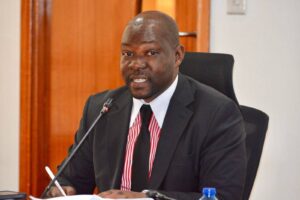Sports Kenya on the Spot Over Billions Spent on Abandoned Projects
Share
The National Assembly’s Public Investments Committee on Social Services, Administration and Agriculture (PIC-SSAA), in a session chaired by Vice-Chairperson Caleb Amisi (Saboti) on October 1 2025, put Sports Kenya management on the spot over serious audit queries dating back to the 2014/2015 and 2015/2016 financial years.
The acting Director General of Sports Kenya, Gabriel Komora and his senior management were present before the committee and lawmakers cross-examined them on billions of shillings that were used in unfinished or abandoned projects that included failed stadium projects.
Projects That Did Not Start Off
MPs expressed outrage over three proposed national stadiums in Nairobi, Kisumu, and Eldoret that were estimated at KShs. 42 billion.
Despite millions spent on consultancy and feasibility studies, Sports Kenya never built the stadiums.
“How do you justify spending millions on consultancy when you don’t even have land titles for these projects?” pressed Hon. Amisi.
Records show Sports Kenya paid KShs. 99.6 million for a feasibility study and KShs. 57 million for architectural and project management services, despite failing to secure formal land ownership for the projects.
Committee members warned that continued stalling of such projects would make Vision 2030 allocations and the Sports Act, 2013 “a wasted investment and poor value for taxpayers.”
Massive Cost Overruns
Cost overruns on existing projects further fueled MPs’ outrage.
The Kipchoge Keino Stadium in Eldoret, initially contracted at Ksh109.7 million, ballooned to Ksh355.1 million, an increase of over 200 percent.
“Why were essential elements that contributed to this massive cost increase not foreseen in the original contract?” demanded Martin Owino.
Sports Kenya failed to provide convincing explanations and MPs ordered management to submit documents relating to a new Ksh3.5 billion rehabilitation contract for the stadium.
Committee also raised concerns over a Ksh 24.4 million payment linked to a Moscow football club.
Komora clarified the matter by saying,”the issue fell under the Ministry of Sports, not Sports Kenya,” but MPs insisted on more accountability.
The audit further revealed that Sports Kenya lacks proper land ownership documents for key national assets, including Kasarani National Stadium and the Moi International Sports Centre.
“We are pursuing titles through the National Land Commission, though we face challenges from encroachment and historical land issues,” Komora explained.
The Auditor-General also flagged irregular handling of statutory deductions.
Sports Kenya withheld Ksh16.3 million in PAYE and Ksh96,388 in pension contributions without remitting them to the relevant authorities.
“Money deducted from employees’ pay is not your money to hold or divert,” cautioned Hon. Wambugu Michael. “Failure to remit attracts unnecessary interest and penalties.”
Management attributed the lapse to inadequate funds, claiming they struggled to balance net salaries and deductions.
Warning on Accountability
Tensions rose when Committee members reminded Sports Kenya’s head of finance, Japeth Kaunyu that the proceedings were judicial in nature.
“Providing false information could lead to standing orders being invoked and even subpoenas,” warned Hon. Amisi.
Committee’s Next Steps
The Committee resolved to conduct a physical inspection of disputed sites, including Kipchoge Keino Stadium, and demanded a comprehensive report on all proposed stadia in Kenya from 2015 to date.
“This Committee will not allow billions of public funds to vanish under the guise of stalled projects,” Hon. Amisi declared.

Vice-Chair person Of PIC-SSAA
Image/Parliament
You Might also Like








